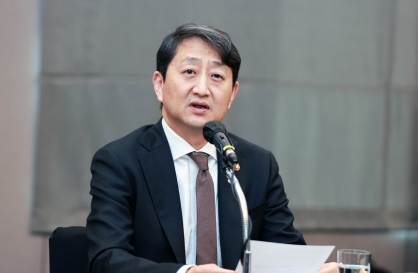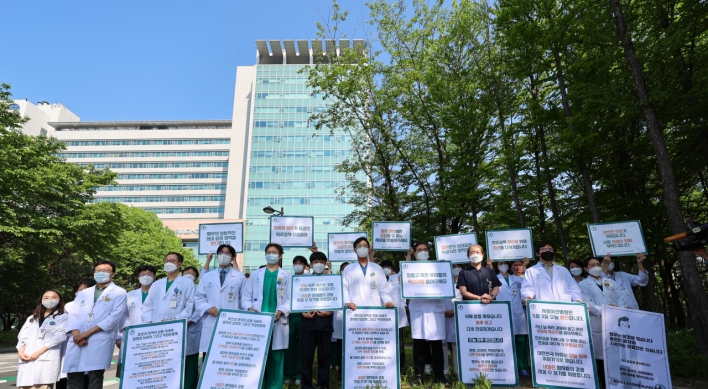Removal of U.S. nuclear umbrella would lead to Seoul contemplate nuclear armament: incoming USFK commander
By KH디지털2Published : April 20, 2016 - 11:26
South Korea would have to think about developing its own nuclear weapons for self-defense if the United States removes its "nuclear umbrella" protection for the Asian ally, the incoming commander of U.S. Forces Korea said Tuesday.
Gen. Vincent Brooks, nominated to succeed Gen. Curtis Scaparrotti as USFK commander, made the remark during a Senate Armed Services Committee confirmation hearing, stressing that it's very important for the U.S. to provide a nuclear umbrella or extended deterrent to the South.
"I think they would have to contemplate that (nuclear armament) to maintain their own security. That question would likely come up," Brooks said in response to a question from Sen. John McCain whether Seoul would be motivated to develop nuclear capability if the U.S. doesn't provide nuclear protection.
Brooks said the U.S. is looking for a non-nuclear Korean Peninsula. He said that the U.S. nuclear umbrella could be withdrawn if "we don't have a nuclear hazard, but we're not at that time now and nor will we be in the near future."
North Korea's fourth nuclear test in January and its long-range rocket launch the following month renewed calls in South Korea for nuclear armament, but the government has rejected the idea as running counter to the principle of a non-nuclear Korean Peninsula.
Brooks also said the South is shouldering a "significant load" of the costs for the stationing of some 28,500 American troops in the country, rejecting U.S. Republican presidential front-runner Donald Trump's claims that Seoul pays almost nothing.
"The Republic of Korea is carrying a significant load and is dedicated to our presence there," he said, adding that the Asian ally is "paying about 50 percent of our personnel cost of being there," which amounts to some US$880 million last year, and the share goes up according to inflation every year.
Brooks also said that South Korea is funding most of the cost for a massive $10.8 billion project to relocate American troops further south, which he called the "largest DOD (Department of Defense) construction project we have anywhere in the world."
"They carry 92 percent of that, 92 cents on a dollar," Brooks said.
When Sen. John McCain asked if it would cost more to keep those troops stationed in the U.S. than it would be in Korea, Brook said, "Absolutely."
Trump has long made unfounded claims that the U.S. has been protecting wealthy nations like South Korea and Japan in exchange for little and should end such protection unless those countries agree to pay more. He has even suggested allowing the allies to arm themselves with nuclear weapons so as to reduce U.S. security burdens.
Brooks, currently commander of U.S. Army Pacific, said that North Korea's asymmetric capabilities, such as long-range missiles, nuclear and cyber capabilities are "causes for great concern."
He said that the North is currently struggling with getting its intercontinental ballistic missile program up and the communist regime will acquire those capabilities over time.
"It's my opinion that North Korea is moving in the wrong direction and the changes we've seen are all provocative and more dangerous -- their willingness to draw blood, to sink vessels, to fire some of their numerous artillery systems into populated areas, to put landmines outside Republic of Korea camps," Brooks said.
"All these things are indications of an escalating approach to crisis. We've seen more crises in the last five years than we've seen in the majority of the time with the armistice. I'm very concerned about that. If confirmed, that would be a focus of my attention," he said.
In written testimony, Brooks said the North's leader, Kim Jong-un, appears to be "more risk-tolerant, arrogant, and impulsive than his father, raising the prospect of miscalculation."
"Compared to his father, Kim Jong-un is more aggressive with advancing the North's nuclear program and ignoring international concerns. His father was more willing to offer negotiations, probably to ease Chinese and other international pressures," the general said.
The commander also stressed the importance of having the THAAD missile defense system in South Korea.
"If confirmed, we would continue to work through this bilateral mechanism of discussing the utility and the possible place of a Terminal High Altitude battery," he said. "In my opinion, it is a needed capability -- whether THAAD or something like that. There needs to be that layer of protection added to a broader set of protections against ballistic missiles."
Asked if the result of the recent parliamentary elections would affect the Korea-U.S. alliance, Brooks said that he's confident that there "will not be a change in the recognition of the need for a strong alliance" regardless of the election results.
All members of the Senate committee praised Brooks for his service and his confirmation is seen as a formality.
If confirmed, Brooks will be the first black USFK commander.
He graduated from the U.S. Military Academy at West Point in 1980, where he became the first black brigade commander or "first captain" of cadets.
He earned a master's degree in military art and science from the School of Advanced Military Studies at the Army Command and General Staff College, and an honorary doctor of laws degree from the New England School of Law in Boston. He also served as a national security fellow at the Harvard University John F. Kennedy School of Government.
About 28,500 American troops are stationed in South Korea to deter North Korean aggression, a legacy of the 1950-53 Korean War,which ended in a truce, not a peace treaty, leaving the divided peninsula still technically at war. (Yonhap)
Gen. Vincent Brooks, nominated to succeed Gen. Curtis Scaparrotti as USFK commander, made the remark during a Senate Armed Services Committee confirmation hearing, stressing that it's very important for the U.S. to provide a nuclear umbrella or extended deterrent to the South.
"I think they would have to contemplate that (nuclear armament) to maintain their own security. That question would likely come up," Brooks said in response to a question from Sen. John McCain whether Seoul would be motivated to develop nuclear capability if the U.S. doesn't provide nuclear protection.
Brooks said the U.S. is looking for a non-nuclear Korean Peninsula. He said that the U.S. nuclear umbrella could be withdrawn if "we don't have a nuclear hazard, but we're not at that time now and nor will we be in the near future."
North Korea's fourth nuclear test in January and its long-range rocket launch the following month renewed calls in South Korea for nuclear armament, but the government has rejected the idea as running counter to the principle of a non-nuclear Korean Peninsula.
Brooks also said the South is shouldering a "significant load" of the costs for the stationing of some 28,500 American troops in the country, rejecting U.S. Republican presidential front-runner Donald Trump's claims that Seoul pays almost nothing.
"The Republic of Korea is carrying a significant load and is dedicated to our presence there," he said, adding that the Asian ally is "paying about 50 percent of our personnel cost of being there," which amounts to some US$880 million last year, and the share goes up according to inflation every year.
Brooks also said that South Korea is funding most of the cost for a massive $10.8 billion project to relocate American troops further south, which he called the "largest DOD (Department of Defense) construction project we have anywhere in the world."
"They carry 92 percent of that, 92 cents on a dollar," Brooks said.
When Sen. John McCain asked if it would cost more to keep those troops stationed in the U.S. than it would be in Korea, Brook said, "Absolutely."
Trump has long made unfounded claims that the U.S. has been protecting wealthy nations like South Korea and Japan in exchange for little and should end such protection unless those countries agree to pay more. He has even suggested allowing the allies to arm themselves with nuclear weapons so as to reduce U.S. security burdens.
Brooks, currently commander of U.S. Army Pacific, said that North Korea's asymmetric capabilities, such as long-range missiles, nuclear and cyber capabilities are "causes for great concern."
He said that the North is currently struggling with getting its intercontinental ballistic missile program up and the communist regime will acquire those capabilities over time.
"It's my opinion that North Korea is moving in the wrong direction and the changes we've seen are all provocative and more dangerous -- their willingness to draw blood, to sink vessels, to fire some of their numerous artillery systems into populated areas, to put landmines outside Republic of Korea camps," Brooks said.
"All these things are indications of an escalating approach to crisis. We've seen more crises in the last five years than we've seen in the majority of the time with the armistice. I'm very concerned about that. If confirmed, that would be a focus of my attention," he said.
In written testimony, Brooks said the North's leader, Kim Jong-un, appears to be "more risk-tolerant, arrogant, and impulsive than his father, raising the prospect of miscalculation."
"Compared to his father, Kim Jong-un is more aggressive with advancing the North's nuclear program and ignoring international concerns. His father was more willing to offer negotiations, probably to ease Chinese and other international pressures," the general said.
The commander also stressed the importance of having the THAAD missile defense system in South Korea.
"If confirmed, we would continue to work through this bilateral mechanism of discussing the utility and the possible place of a Terminal High Altitude battery," he said. "In my opinion, it is a needed capability -- whether THAAD or something like that. There needs to be that layer of protection added to a broader set of protections against ballistic missiles."
Asked if the result of the recent parliamentary elections would affect the Korea-U.S. alliance, Brooks said that he's confident that there "will not be a change in the recognition of the need for a strong alliance" regardless of the election results.
All members of the Senate committee praised Brooks for his service and his confirmation is seen as a formality.
If confirmed, Brooks will be the first black USFK commander.
He graduated from the U.S. Military Academy at West Point in 1980, where he became the first black brigade commander or "first captain" of cadets.
He earned a master's degree in military art and science from the School of Advanced Military Studies at the Army Command and General Staff College, and an honorary doctor of laws degree from the New England School of Law in Boston. He also served as a national security fellow at the Harvard University John F. Kennedy School of Government.
About 28,500 American troops are stationed in South Korea to deter North Korean aggression, a legacy of the 1950-53 Korean War,which ended in a truce, not a peace treaty, leaving the divided peninsula still technically at war. (Yonhap)








![[K-pop’s dilemma] Time, profit pressures work against originality](http://res.heraldm.com/phpwas/restmb_idxmake.php?idx=644&simg=/content/image/2024/05/08/20240508050705_0.jpg&u=20240508171126)
![[K-pop’s dilemma] Can K-pop break free from ‘fandom’ model?](http://res.heraldm.com/phpwas/restmb_idxmake.php?idx=644&simg=/content/image/2024/05/09/20240509050541_0.jpg&u=20240509173751)








